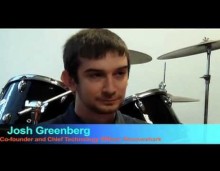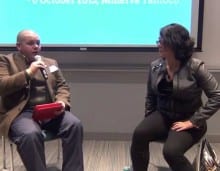Farm Factor – Dr. Rob Fraley and Global Food Production – April 5, 2016
(Jamie) We’re back! Let’s join Kyle and Dr. Fraley as they talk about the challenge of global food production.
(Kyle) Hi this is Kyle Bauer at the Cattleman’s Convention in San Diego, have the opportunity to visit with Rob Fraley. Rob is with Monsanto Corporation. Have the opportunity to see a lot of the trends around the world. And we have an opportunity to pick your brain a bit on that. We’ve seen huge demand increase on food production around the world. Will that continue? (Rob) Yea, I mean I started the talk this morning talking about that challenge of food production. You know, 7.3 billion people on the planet today. By 2050 10 billion people. Almost as important is the fact that the middle class is growing. We expect world wealth to increase and two to three billion more people join the middle class. You put those numbers together, more people and more wealth, the basic math says food production needs to double by 2050. And I always make the point that if you say 2050 really fast enough it seems like a long way away. I just had my birthday yesterday and 2050 is 34 years. It’s a heartbeat. And so it’s both a huge challenge for agriculture to meet that demand, but frankly I believe we have the science, the tools and the capabilities and we can achieve it. (Kyle) But it’s not just feeding those people, it appears the world really looks for red meat, or I’m sorry, meat protein in their diet and that’s one of the first things that they invest their money in. (Rob) Absolutely. Both from the point of view of the nutritional content of meats and protein products but also when we look at those demographic trends as we see world wealth increasing across Asia and across Africa. And Africa is undergoing explosive growth. If you look at the last 10 years, five of the fastest growing economies in the world have been in Africa. And the projections are now that by 2050 coming around, 34 years from now, some of the African cities will be the largest cities in the world. (Kyle) You know one thing we talk about is the city is growing and the population is growing and we wonder if people will have the money to buy the food that we like to produce for them. So growth in income is a big deal. But as the populations of the world move to cities, generally income goes up. (Rob) Yea, that’s right and we’ve seen that in our country. I grew up a family farm in Illinois. My Dad and my Grandpa farmed. When my Grandpa was farming in the state of Illinois half of the people were on the farm and they were involved in agriculture. Today it’s one percent. But it’s that increase in productivity of our farmers and ranchers that have enabled the growth of cities and other industries. And we’re starting to see that trend around the world as more and more people in China move to cities. We’re starting to see the same trend across other Asian and African countries. And so it really means that agriculture needs to become more productive, that’s one of the reasons we need the new technologies. But it’s also clear we need to produce more food, more efficiently to meet both the food security demands by 2050, but also farm and ranch in a way that we actually enhance the environment. And that’s what I think new technology can enable us to achieve. (Kyle) That’s Rob Fraley. He’s with Monsanto Corporation, Chief Technology Officer. This is Kyle Bauer, reporting from San Diego. Back to you Jamie.
(Jamie) Thanks, Kyle. Next up is this week’s Kansas Soybean Update.
source


